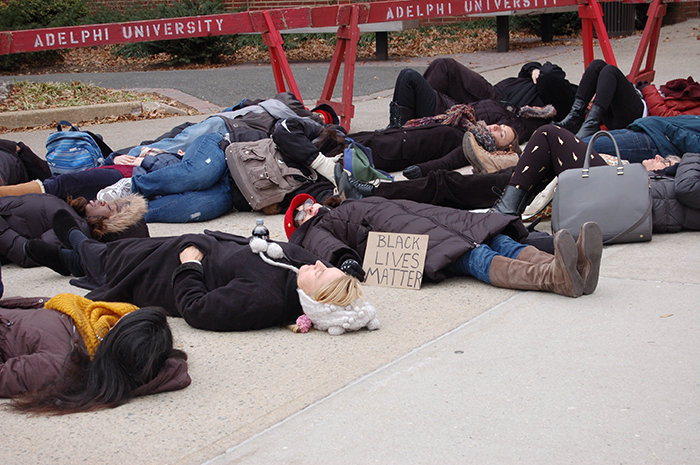A discussion on race, police use of force and the law took place at Adelphi University's Olmsted Theatre on December 8, 2014.
Ten students from the criminal justice group at Adelphi University took to the stage in Olmsted Theatre and offered a moving tribute to 10 African American males killed in recent years by police (or by a civilian, in the case of George Zimmerman, who killed teenager Trayvon Martin in 2012).
Each of the 10 students read what were believed to be the final words spoken by each victim, along with his name, age and date of death.
“‘I Can’t Breathe.’ Eric Garner. Age: 43. July 17, 2014,” the final student read in remembrance of the Staten Island, New York, father of six whose death from what appeared to be a chokehold was captured on video. A grand jury decided to not indict the police officers involved, sparking protests around the world.
“Why did Eric Garner resist arrest? Because he felt that what the police were doing was fundamentally illegitimate,” said Alex Vitale, Ph.D., the keynote speaker at the December 8, 2014, event, “A Discussion on Race, Police Use of Force and the Law: From Michael Brown to Eric Garner and Beyond.”
About a hundred students, faculty members and administrators attended the event, organized by Stephanie Lake, Ph.D., director of the criminal justice program and professor of sociology in the College of Arts and Sciences.
Dr. Vitale called for the abolishment of New York City’s “broken windows” policy, which compels police to make arrests for petty offenses under the premise that it prevents those apprehended from committing more serious crimes. Police had attempted to arrest Garner for selling untaxed cigarettes, known as “loosies.”
“There is no evidence whatsoever that the broken windows policy reduces crime,” Dr. Vitale said. “Such policies—and the unequal enforcement of drug laws—have led to criminalizing a whole generation of people of color.”
Dr. Vitale, a professor of sociology at Brooklyn College, has been published in peer-reviewed academic journals and in many media outlets including The New York Times, The Nation and alternet.org. He’s the author of City of Disorder: How the Quality of Life Campaign Transformed New York Politics and co-editor of People, Power, and Politics. His wife, Elizabeth Palley, Ph.D., is a professor in Adelphi’s School of Social Work.
Earlier in the day, dozens of students on the Garden City campus protested by staging a “die-in” outside the Ruth S. Harley University Center. The event drew further attention to the killings of unarmed African Americans such as Garner, Brown, Martin and Sean Bell, as well as to the absence of convictions in any of those cases.
“There is definitely a renewed sense of activism among students,” said Dr. Lake, who attended the die-in along with other faculty members, including Traci Levy, Ph.D., an associate professor and chair of the Department of Political Science.
“Students are often overwhelmed by a corporate media that entertains them rather than informs them,” Dr. Lake said. “But on issues of social justice, students are determined to make their voices heard.”
For further information, please contact:
Todd Wilson
Strategic Communications Director
p – 516.237.8634
e – twilson@adelphi.edu
